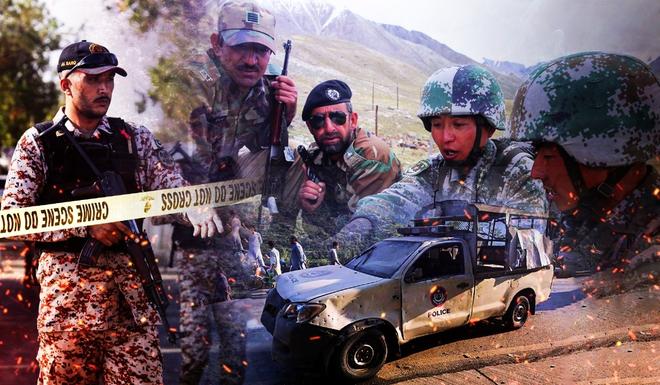Published 15:22 IST, November 26th 2024
Pakistan Launches Major Military Op in Balochistan as Chinese Troops Arrive for Exercise Warrior-8
Pakistan has announced a military operation in Balochistan, targeting groups such as the Balochistan Liberation Army and Balochistan Liberation Front.

Islamabad, Pakistan - Pakistan has announced a comprehensive military operation in the volatile province of Balochistan, ostensibly targeting militant groups responsible for a recent wave of deadly attacks. The decision, approved by the Federal Apex Committee of the National Action Plan on November 19, 2024, comes amid growing scrutiny of Islamabad's long-standing role in fostering terrorism as a state policy.
The operation, spearheaded under the leadership of Prime Minister Shehbaz Sharif and Army Chief General Asim Munir, aims to dismantle militant organizations such as the Majeed Brigade, Balochistan Liberation Army (BLA), Balochistan Liberation Front (BLF), and Balochistan Raaji Anjou-R-Sanger (BRAS). These groups are accused of destabilizing Pakistan through attacks on civilians, foreign nationals, and infrastructure.
However, the timing and intentions of this move raise serious questions, especially given Pakistan's history of using militant proxies as tools for strategic depth, while cracking down selectively on groups that challenge its authority.
Deadly Attacks or Strategic Distraction?
The announcement follows a deadly bombing at a railway station in Balochistan, which claimed 26 lives, including 14 soldiers. While the attack highlights the deteriorating security situation in Pakistan, observers note that Islamabad has a track record of exploiting such incidents to mask its complicity in nurturing terrorism or deflect attention from domestic failures.

Rather than addressing the systemic roots of extremism, Pakistan’s strategy often revolves around suppressing dissent in regions like Balochistan, where demands for autonomy and resource control clash with Islamabad's centralized policies.
Hollow Promises or Real Reform?
The committee meeting, labelled “Reinvigorating Pakistan’s Counter-Terrorism Campaign,” promised a unified national approach to countering terrorism. Measures included revitalizing the National Counterterrorism Agency (NACTA) and establishing intelligence fusion centres under the framework of "Azm-e-Istehkam."
Yet, similar promises in the past have failed to yield results. Critics argue that such measures often serve as cosmetic exercises to placate international pressure while Pakistan continues to harbour terror groups like the Lashkar-e-Taiba (LeT) and Jaish-e-Mohammed (JeM), which operate freely to target neighbouring India.
Pakistan-China Military Drills
Amid this crackdown, Chinese troops have arrived in Pakistan for the "Warrior-VIII" joint anti-terrorism exercise, signalling a deepening military partnership. With over 300 Chinese soldiers participating, the exercise focuses on counter-terrorism tactics, including live combat scenarios.
This collaboration, however, raises alarms in New Delhi. Pakistan’s use of Chinese military expertise and funding to bolster its security apparatus poses a direct challenge to India, particularly as both countries ramp up efforts to protect investments under the China-Pakistan Economic Corridor (CPEC).

Observers note that Chinese investments in Balochistan, valued at over $65 billion, have drawn militant attacks in the region. However, instead of addressing local grievances, Pakistan appears to be militarizing the region further, with Beijing’s support, under the pretext of counter-terrorism.
Pakistan’s Duplicity in Counter-Terrorism
Pakistan’s narrative of a "renewed commitment" to counter-terrorism rings hollow when juxtaposed with its own role in fostering extremist groups. While Islamabad claims to target insurgents in Balochistan, it remains the epicentre of state-sponsored terrorism, sheltering globally designated terror operatives like Masood Azhar and Hafiz Saeed.
India, in particular, has borne the brunt of Pakistan’s duplicity. Insurgent activities in Kashmir and cross-border infiltration continue unabated, fueled by terror networks operating with impunity from within Pakistan. Meanwhile, the so-called counter-terrorism measures in Balochistan often serve as a cover for suppressing legitimate calls for autonomy and justice in the resource-rich province.

For India, Pakistan’s operation in Balochistan and its growing reliance on China signify an evolving challenge. The increasing militarization of the region under the guise of counter-terrorism not only exacerbates tensions along the Line of Control (LoC) but also strengthens Pakistan’s ability to destabilize India through asymmetric warfare.
China’s involvement, particularly its anti-terror drills with Pakistan, further complicates the security dynamics. By embedding itself deeper into Pakistan’s internal and military affairs, Beijing bolsters Islamabad’s capacity to wage hybrid warfare against India, even as it safeguards its economic interests under CPEC.
Updated 15:22 IST, November 26th 2024













